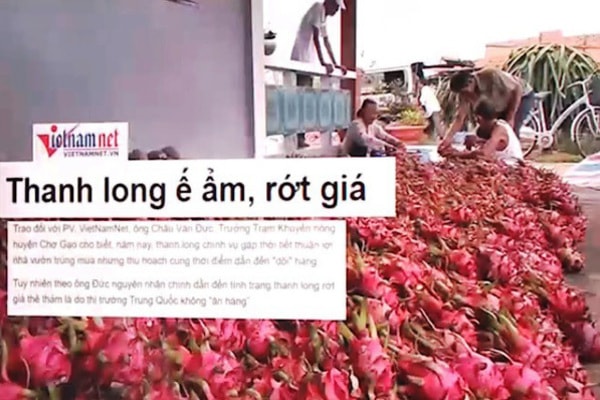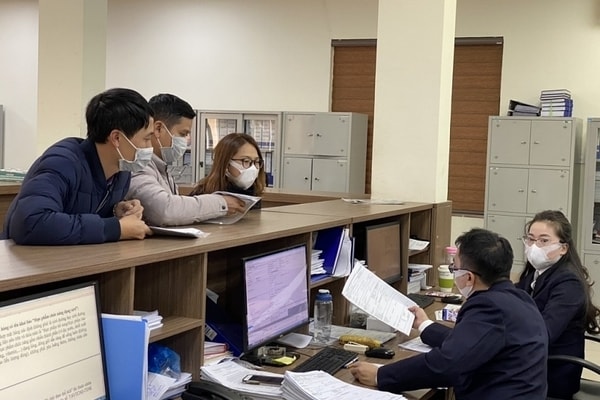In the pandemic vortex, borders are silent, goods are stagnant
China has begun to restrict import and export activities, affecting the consumption of goods, especially agricultural and aquatic products from Vietnam.
Worried about unsold goods
The complicated developments of the corona epidemic have strongly affected trade activities, including the export and import of goods from Vietnam, especially agricultural products exported to China.
A representative of a fruit import-export business worried: "The coronavirus outbreak has caused businesses like ours to fall into a dire situation because purchasing plans as well as signed contracts with Chinese customers have all been canceled."
“Even shipments of products that have been cut and are planned to be exported or are on their way to China are also affected. Not only dragon fruit, even mangoes and durians, which are fruits that have not been licensed for official import by China, are also greatly affected. Businesses are left with inventory and suffer heavy losses,” the company shared.
 |
| Agricultural products are stagnant and prices are falling sharply. |
A representative of the Lao Cai International Border Gate Customs Branch said that due to the corona epidemic, China is temporarily suspending the border market for border residents, so import and export activities through Lao Cai International Border Gate (Kim Thanh International Road Border Gate No. II) are quiet, especially the export of agricultural products from Vietnam to China.
Statistics from Lang Son Customs Department show that the corona epidemic has strongly affected import-export and immigration activities.
Specifically, from January 22 (the 28th day of the Lunar New Year) to January 28 (the 4th day of the Lunar New Year), border gate units processed procedures for 22,432 passengers entering and exiting through Huu Nghi international border gate, Dong Dang international railway station and Chi Ma border gate. This number decreased by 52.6% compared to the same period in 2019).
Border gate units also processed 242 sets of import-export declarations with a turnover of 4.7 million USD, down about 45% compared to the same period in 2019.
That caused the budget revenue of Lang Son Customs Department to decrease sharply. From the beginning of the month to January 30, the budget revenue of this unit only reached 162 billion VND, down 40.6% compared to the same period in 2019.
This situation will continue in the coming time because China announced that from January 31 (the 7th day of the Lunar New Year) to February 8 (the 15th day of the first lunar month), it will close all markets and secondary border gates, and temporarily suspend import and export activities in Lang Son. In particular, Huu Nghi international border gate will clear goods from January 10.
This has caused some agricultural products in season such as dragon fruit and watermelon to fall into a slump and plummet in price. For example, the corona virus has caused the price of dragon fruit in the West to drop from 37,000 VND/kg to 5,000 VND.
Mr. Phan Van Chinh, Director of the Import-Export Department (Ministry of Industry and Trade), said at the meeting on January 31 of the Ministry: "Because China has begun to restrict import and export activities, it has had a certain impact on the consumption of goods, especially agricultural and aquatic products of Vietnam."
Ms. Le Hoang Oanh, Director of the Asia - Africa Market Department, shared: China's announcement to temporarily suspend the exchange of goods between Yunnan and Guangxi provinces with Vietnam has directly affected the export of agricultural products, especially Vietnamese fruits to China. Many Chinese enterprises have canceled import contracts or delayed the implementation of signed import orders. In addition, China also restricted people's travel, which directly affected the domestic tourism and service industries.
 |
| Customs officers and customers both wear masks during transactions. Photo: Haiquanonline |
“Even the plan to organize 3 working groups of the Chinese Customs Department to visit Vietnam to discuss and complete the report on opening the market for bird's nest products in February and March may have to be postponed,” said a representative of the Asia-Africa Market Department.
Find new markets
According to the assessment of the Ministry of Industry and Trade, the epidemic will continue to have increasingly complicated developments, making it difficult to predict the time of effective control of the epidemic and will have short-term and long-term impacts on trade and economic cooperation between Vietnam and China in three aspects.
One is exporting Vietnamese agricultural and aquatic products to China. Two is exchanging and trading between businesses of the two countries. Three is promoting negotiations to open the market and remove difficulties for some of Vietnam's strong products exported to the Chinese market.
According to the representative of the Ministry of Industry and Trade, along with continuing to maintain stable export activities to China, it is necessary to research and find alternative export markets for Vietnamese goods, especially agricultural and aquatic products. Typically, with rice, we will focus on markets such as Indonesia, the Philippines, South Korea or the African market; with coffee, we can find new markets in the Middle East; and with dragon fruit, we can expand the market to Japan, South Korea, Hong Kong and Taiwan, etc.
At the meeting on January 31, Minister Tran Tuan Anh assessed that finding and expanding markets is necessary, and in fact the Ministry of Industry and Trade has been actively implementing it. However, in the context of the complicated developments of the nCoV epidemic, it is necessary to first focus on markets with potential and room for development.
The Minister of Industry and Trade also requested the Import-Export Department to closely monitor the situation and developments at border gates, promptly notify businesses and associations to have appropriate plans in case import-export activities with China are restricted or suspended to implement anti-epidemic measures.
“Coordinate with the Department of Industry to review imported raw materials for mask production at domestic production facilities, ensuring raw materials for production to avoid disrupting production activities to provide essential goods for disease prevention and control,” the Minister of Industry and Trade requested.
